|
|
|
Sort Order |
|
|
|
Items / Page
|
|
|
|
|
|
|
| Srl | Item |
| 1 |
ID:
178080
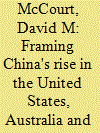

|
|
|
|
|
| Summary/Abstract |
Optimism about China's rise has in recent years given way to deep concern in the United States, Australia and the United Kingdom. Drawing on an original set of interviews with China experts from each country, and an array of primary and secondary sources, I show that shifting framings of China's rise reflect the dynamics of the US, Australian and UK national security fields. The article highlights three features specifically: first, the US field features a belief that China's rise can be arrested or prevented, absent in Australia and the UK. I root this dynamic in the system of professional appointments and the intense US ‘marketplace of ideas’, which gives rise to intense framing contestation and occasional sharp frame change. I then identify the key positions produced by each field, from which key actors have shaped the differing interpretations of China and its meaning. The election of Donald Trump, a strong China-critic, to the US presidency empowered key individuals across government who shifted the predominant framing of China from potential challenger to current threat. The smaller and more centralized fields in Australia and Britain feature fewer and less intense China-sceptical voices; responses have thereby remained largely pragmatic, despite worsening diplomatic relations in each case.
|
|
|
|
|
|
|
|
|
|
|
|
|
|
|
|
| 2 |
ID:
128848
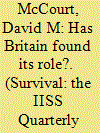

|
|
|
|
|
| Publication |
2014.
|
| Summary/Abstract |
The question is not whether Britain is a great power, but whether it does what great powers do. In the absence of wider changes, Britain will continue to play this role. 'What is Britain's role in the world?' Answering this question is a vital step in a successful review of British security and defence provision. The conclusions of the latest chapter of this review process will be published in 2015, in an update to the 2010 Strategic Defence and Security Review (SDSR), which was itself the first for 12 years. The 2010 SDSR declared that 'any strategy for our national security must begin with the role we want to play in the modern world.' As Liberal Democrat Member of Parliament Menzies Campbell put it, 'the central question is: what role do we want Britain to play, and how much, as a nation, are we prepared to pay?' Defence reviews are thus about more than how many guns, ships and aircraft the armed forces will have at their disposal; they are concerned with thinking holistically about Britain's place in the world.
|
|
|
|
|
|
|
|
|
|
|
|
|
|
|
|
| 3 |
ID:
188881


|
|
|
|
|
| Summary/Abstract |
The United States’ long-standing approach to the People’s Republic of China—“engagement”—is at an end, replaced by a tougher approach, labeled “strategic competition.” Foregrounding the role of knowledge communities in the making of US foreign policy, I show that engagement’s demise followed less a rational process responding to shifts in Chinese behavior and the balance of power, and more a paradigmatic turnover in key individuals’ views of China within the government and the China expert community. Adopting a sociological perspective attuned to the social and professional underpinnings of US foreign policy, I trace the paradigmatic turnover in US views of China to three processes: politicization, professional status competition, and personalization. Drawing on a range of sources, including over one hundred original interviews with members of the US China expert community, this article traces the entanglement of engagement at once political, professional, and deeply personal.
|
|
|
|
|
|
|
|
|
|
|
|
|
|
|
|
| 4 |
ID:
148034
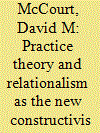

|
|
|
|
|
| Summary/Abstract |
In this theory note, I address two new approaches in international relations theory gaining adherents and producing insightful applications: practice theory and relationalism. Practice theory draws attention to everyday logics in world politics. It stresses how international actors are driven less by abstract notions of the national interest, identities, or preferences than by context-dependent practical imperatives. Relationalism rejects the idea that entities—like states and international organizations—are the basic units of world politics. It replaces them with a focus on ongoing processes. Noting similarities in their arguments to those advanced by early constructivists, I argue that, taken together, practice theory and relationalism represent the New Constructivism in International Relations (IR). A practice–relational turn became necessary because the meaning of constructivism narrowed over time, becoming tied to a specific scientific ontology focusing on the role of identity, norms, and culture in world politics. This ontology unduly narrowed constructivism’s theoretical lenses, which practice theory and relationalism productively reopen.
|
|
|
|
|
|
|
|
|
|
|
|
|
|
|
|
| 5 |
ID:
114980


|
|
|
|
|
| Publication |
2011.
|
| Summary/Abstract |
Did Britain reinvade the Falklands because of its 'identity'? Or was reinvasion instead required by its 'role' in international politics? In this article I show that a complete constructivist explanation of Britain's response must consider both its identity affirmation, which constructivist International Relations (IR) theory would certainly draw attention to, but also the role it played on the world stage at the beginning of the 1980s, which would very likely be overlooked. I show that a solely identity-based explanation is incomplete and ultimately unpersuasive since identities are affirmed by playing social roles, which give identity meaning. In 1982, a number of roles could have fulfilled this function for Britain; it is important then that Britain chose and was able to play the role of a status quo oriented power rather than that of a colonial power. Beyond offering a more complete interpretation of the events, the article clarifies the links between roles, identity, and action in international politics, and the type of theory appropriate to such analysis.
|
|
|
|
|
|
|
|
|
|
|
|
|
|
|
|
| 6 |
ID:
092072
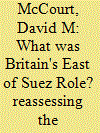

|
|
|
|
|
| Publication |
2009.
|
| Summary/Abstract |
Although often considered an objective fact, Britain's "East of Suez role" was actually a rhetorical construction. As such, it was dependent on the continued ability of Britain to "make" that role and other important players to "cast" Britain into it. But the Wilson government's initial support for East of Suez had the paradoxical effect of bringing its coherence into question. Without a British future in Aden, East of Suez was increasingly linked solely to the Far East, where, with the end of Confrontation in 1966, the argument for staying lost much of its force. Other interested Powers were also increasingly unable to cast Britain into the role: the nationalist tide and the United States' tribulations in Vietnam being primary factors. The article thus shows that thinking through the implications of this realisation provides a better understanding of the withdrawal than by resting on economic or domestic political factors alone.
|
|
|
|
|
|
|
|
|
|
|
|
|
|
|
|
| 7 |
ID:
117760


|
|
|
|
|
| Publication |
2012.
|
| Summary/Abstract |
Taking issue with Hobson and Lawson's rejection of the historical turn, this article argues that what is at stake in the turn is the type of knowledge of politics International Relations scholars should produce, and the relationship between theory and practice. The relevant issues are not, then, exhausted by answering the question 'What is history in International Relations?'; instead, the turn forms part of a wider movement in the social sciences away from neo-positivism and its deficient vision of history. The article follows one line of thought on non-neo-positivist International Relations and its relationship to history that seeks to emphasise the centrality of historical knowledge to political praxis understood as practical wisdom or phronesis. However, while a turn is thus to be welcomed, because the impact of International Relations knowledge lies ultimately in the relationship between the academy and politics, the stakes of the historical turn lie beyond International Relations, adequately historical or not.
|
|
|
|
|
|
|
|
|
|
|
|
|
|
|
|
| 8 |
ID:
159482
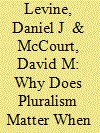

|
|
|
|
|
| Summary/Abstract |
Pluralism has become a buzzword in International Relations. It has emerged in a number of linked literatures and has drawn the support of an unusual coalition of scholars: advocates of greater methodological diversity; those who feel that IR has degenerated into a clash of paradigmatic “-isms”; those who favor a closer relationship between academics and policy-makers; and those who wish to see greater reflexivity within the field. Perhaps unsurprisingly, no single vision of pluralism unites these scholars; they appear to be using the term in divergent ways. Accordingly, our aim is threefold. First, we wish to highlight this odd state of affairs, by placing it in disciplinary and intellectual context. Second, we distinguish between plurality—the de facto recognition that IR has become a more diverse field—and pluralism—a normative position which values that diversity, given the public vocation of social science. Finally, we lay out a more consistent understanding and defense of pluralism in those latter terms. We argue that, properly understood, pluralism entails a position of epistemological skepticism: the straightforward claim that no single knowledge system, discipline, theory, or method can claim singular access to truth.
|
|
|
|
|
|
|
|
|
|
|
|
|
|
|
|
|
|
|
|
|